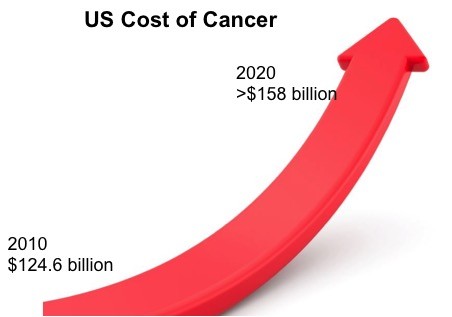Based on the growth and aging of the U.S. population, medical expenditures for cancer treatment and care in the year 2020 are projected to reach at least $158 BILLION – an increase of 27% over 2010, according to a National Institutes of Health analysis.
This number could jump to $207 BILLION with the development of more expensive treatments options and diagnostic tools.
According to the World Health Organization, prevention offers the most cost-effective long-term strategy for the control of cancer.
Millions of Americans do not realize the everyday choices that impact their cancer risk. One in two Americans are now overweight or obese; but only half understand that this places them at increased risk for many cancers.

Source: Projections of the Cost of Cancer Care in the US. Jan 19, 2011, JNCI.
Prevention is the key to both better health and lower health-care costs over the long haul. AICR estimates that close to 1/3 of common cancers in the US – nearly 350,000 cases – can be prevented through a healthy diet, maintaining a healthy weight, and getting 30 minutes of physical activity each day. If you add in not smoking and avoiding sun damage, that estimate grows to 50%.
The burden of rising health care costs for cancer is a challenge for the patients, their families, communities, insurance companies and state and federal governments, and highlights the importance for us to continue advancing the science of cancer prevention.
Together, we will continue to fund leading edge cancer research and develop programs to educate the public about making lifestyle changes that will help prevent cancer. The result is significant cost savings for everyone.





